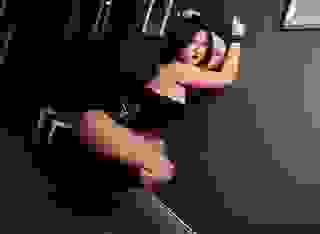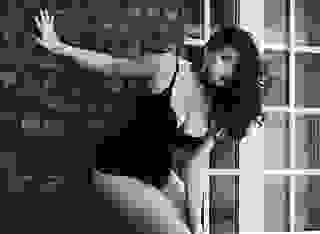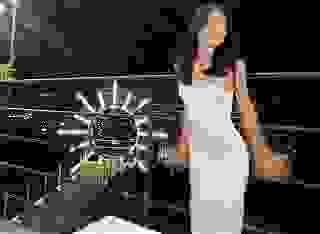- Sci-Fi & Fantasy
- Intermezzo Ch. 01-07
Note: You can change font size, font face, and turn on dark mode by clicking the "A" icon tab in the Story Info Box.
You can temporarily switch back to a Classic Literotica® experience during our ongoing public Beta testing. Please consider leaving feedback on issues you experience or suggest improvements.
Click here(note: this is a segment of the ongoing Eighty-eighth Key/Come Alive/TimeShadow series, so to understand the characters in this story you should have read these earlier elements before venturing here. AL)
Intermezzo -- Madness and the Desperate Flight of aquaTarkus
Harry Callahan walked from his living room to the kitchen, trying out his new leg. His latest new leg.
"What a fucking pain in the ass," he growled as he stopped and leaned against a column, turning the cup ever so slightly, seating the soft deerskin to his stump.
"Is it better than the chair?" Eisenstadt asked to his back, watching his flaring moods. "If not, I can bring it up from the garage if you like?"
Callahan grumbled and walked into the kitchen, headed for the coffee maker. He poured a large cup and added a strong hit of Baileys Irish Cream -- just because -- then he walked back through the living room to his piano. He pulled out his "Works in Progress" file from the desk and looked at the sheet music on top -- and then he sighed.
"Some days this feels too much like work," he said, his voice almost a whisper.
"Why don't we drive down to the city? Maybe go to the Cathouse for a visit?"
He nodded but turned and sat at the keyboard, then tentatively played a few disjointed notes -- until he felt Eisenstadt walk up from behind.
"What's troubling you, Harry? Is it the dream -- again?"
He hesitated, but then he slowly nodded. "Yes. It felt even more real last night."
"How so?"
"It was very hot -- the ground was dry -- almost dusty, but the dust was white -- almost like flour -- in a way," Callahan said, his words coming in short bursts followed by long, drawn-out pauses, as if he was sifting through debris left by a passing storm.
"Was it night, like the last one?"
"Moonlight. Bright moonlight -- like under a full moon. Cactus shadows -- and even the rocks cast shadows."
"What did you hear?" she asked...carefully...placing her hand on his shoulder as his hands levitated, fingers spreading like talons in search of prey. She heard the chord form and closed her eyes and in the next instant, they were both standing in a high desert landscape, the moon like a searchlight high overhead. 'Blue,' she thought, 'everything is blue...'
She looked down and gently kicked a stone...and the stone tumbled away. Again. Just like last time. They were no longer passive observers, not in this landscape, and she knew now that they had to proceed with the utmost caution...because one falling rock could soon turn into a landslide.
"Is that a trail?" Harry asked as he pointed at the rough outlines of a path.
"I think so, but Harry...?"
"Yes...?"
"If this is a dream why are we here?"
"What?"
"Dreams are constructs of the unconscious mind. They are not real."
He nodded. "Ah, I see. And this is, or at least it appears to be, a real place."
"Or...we can now access the real through the unconscious mind."
An aircraft of some kind crossed the sky-high overhead, its white strobes pulsing in the night sky as it flew from northeast to southwest, and Callahan had no trouble identifying it. "Looks like a trip-7 headed to LAX," he sighed.
"How can you tell?"
"Find Polaris, check the angle against Arcturus and Spica. He's headed west-southwest and powering down for his descent. So, we're in Nevada -- or maybe even western Utah."
"So, this isn't a dream?"
Callahan shrugged. "I don't know. Is it a dream within a dream, or was I dreaming of a real place?"
"What happened next? In your dream, I mean?"
"Well, I..." Callahan began -- just as a low humming sound filled the night.
"What is that?" Eisenstadt cried -- as the humming quickly built in intensity...
Callahan turned and pointed: "There it is," he said, his voice barely audible now.
Eisenstadt turned and she saw a triangular-shaped hole in the sky. "What is that?" she whispered.
"That," Callahan sighed, "is a ship."
"You mean...like an UFO?"
"Not like. Is," Callahan said, nodding at the ship as it descended towards the valley floor.
"And this is what you dream about?"
"Yeah, and it usually ends about now."
"What...with the ship just up there?"
"Yup."
She broke contact and they were in the living room again, yet when she looked at her shoes they were almost completely covered with the fine white powdery sand of the desert trail, and Callahan's were, too. "Harry, we were there."
"Yeah, I know. I'm still cold."
And then Eisenstadt realized she was, as well. She touched Callahan's arm and his skin was almost ice-cold, yet he was warming up nicely in the piano room as they were close to the fireplace. Then, almost on a hunch she turned and looked at the ceiling in the living room -- and yes, one of the tiny blue spheres was hovering silently inside a shadowy corner. "Harry," she whispered.
"Yeah, I know. I can feel them now."
"Wait...you can feel them?"
He nodded. "It's almost like a fullness in my neck, at least it feels that way when one of them is around..."
"It's up there," she added, nodding her head in the direction of the fireplace.
"What color is this one?"
"What color? But...they're always blue..." but her words were full of doubt, like the memory wasn't quite trustworthy.
"No, they're not," he said, his words steely calm.
"They aren't? Are you sure?"
He nodded. "Yup. Blues most of the time, but I've seen green and red ones. And a pink."
"Are you sure it's not the scotch?"
He chuckled at that. "Yeah, I'm sure." He paused then, and she thought he might have been lost in thought -- until a tremor crossed his frame. "The blues aren't friendly, Deborah. None of them are, though I'm not sure about the pink one. For some reason..." he started to say, but then he stopped again, like maybe he was looking for just the right memory. Then his head canted a little. "The pink one is a friend. She's very curious...about..."
"The piano," she sighed.
"Yes, the piano." He squinted once then felt his neck. "How many are up there now?" he asked.
When she looked now she saw several were up there, and suddenly she felt sleepy and wanted to tell Harry. When she turned and looked at him he was already asleep, and, for the briefest moment, she thought she was floating through vast fields of stars.
+++++
Jeff Woodson drove up Central Avenue and, as he approached the crash site he pulled off the road and parked the van on the grass, then set the stabilizers, leveling the van for the remote feed antenna. His crew jumped out and sprang into action, setting up tripods and mounting their heavy video cameras, then hooking the output lines directly to the satellite transmitter. Woodson got the dish aligned just as Sandy Mullins and her team drove up; this second van parked beside Woodson's and now, in effect, the Eagle Network had an on-site studio set up less than a hundred yards from where the stricken airliner had fallen.
Henry Taggart got out of the van and watched the blue sphere settle just inside the dense black smoke -- and unless you knew exactly what you were looking at you'd have never realized anything was there, and he had to smile at that, at their ability to hide undetected right above the scene of an immense disaster. He also realized there was nothing he could do here except get in the way so he called for a taxi and then walked over to Woodson.
"I'm going back to the boat," he told the team leader. "When you guys wrap here you'd better come..."
"Man, we won't be done here for days," Woodson said, and Mullins nodded.
"The network has on-air reporters headed this way right now," Mullins said. "This is a great spot to shoot from."
Taggart nodded. "When you two knock off why don't you come back down to the boat."
"That cop?" Mullins said, the situation dawning on her.
"Yeah. Strength in numbers, or something like that," Taggart said. "I called a cab so I'm headed that way now."
"Okay," Woodson added, "we'll try. My best guess is around seven."
Taggart nodded, then he saw a taxi pull up and he waved to the driver. "Okay. See you tonight."
Henry walked over to the taxi, and as he stepped inside he felt as if he was being watched.
"Did you see that mess?" the cabbie asked.
"Unfortunately, yes."
"It's all over the news right now. Some are saying it was a helicopter that hit the jet."
"Yup."
"You saw it?"
"I did."
"Jesus. So, where can I take you?"
"The Marina. A restaurant down there called The Warehouse."
"Okay." The cabbie pulled out into traffic and Taggart leaned back on the slimy old vinyl seat, beyond caring as the old Chevy made its way towards the water. At one point he felt a wave of nausea wash over him and he asked the cabbie to turn on the air conditioner -- but it didn't help. Nothing, he knew, would ever wipe the sight of that helicopter vaulting up and hitting the jet's engine. He could still see the helicopter's rotors splintering, then the huge engine tearing away from the wing, before the worst part unfolded. It was the way the jet wallowed for a moment, then it just seemed to roll to the right as it started to fall out of the sky, and he couldn't help but think of the sheer terror all the people on board must have experienced. Those last few seconds -- knowing these were your last heartbeats, the last breaths you'd take. The last things you'd see and try to file away as memory before the world around you dissolved into fire and chaos. Would you, he wondered, feel pain? Or would death come on so hard and fast that even pain would fail to register?
The thought made his skin crawl.
Then he let his head fall away and he looked up into the sky and yes, there it was. Following him, still up there in the clouds.
'So,' he mumbled to the realization, 'it's following me?'
He got out at the restaurant and walked over to a park bench and began watching Deb's boat, and when he was sure no one else had her under surveillance he made his way out the pier and quietly slipped onboard, disarming the alarm as he entered the cockpit.
"Deb?" he called out, and he heard Daisy Jane bark once so he went and looked in the hatch over her berth and saw she was sound asleep. He unlocked the companionway, found Daisy's leash and took her for a quick walk, then went below to wake Deb, maybe take her out to lunch.
"Could you take the Rover, go get some Thai?" she asked after she rubbed the sleep from her eyes.
"I reckon so? You want the usual?"
"Seafood Tom Yum and a fresh spring roll."
"Okay. I'll be back in a half-hour or so."
"Should I set the alarm?"
"Hell-yes!" Taggart said through his habitual grin.
By the time he made it back she was setting out places on the cockpit table and Daisy was curled up in the sun, her long line of sutured skin healing well. He sat beside the pup and began rubbing the top of her head and she moaned.
"What did you get?" Deb asked as she studied the lingering uncertainties within his aura.
"Tom Ka Gai and a green curry."
"Shrimp?"
"Just veggies. Extra mushrooms, though. And two orders of spring rolls."
"Good. I was hoping you might."
Daisy rolled over and put her head on his lap and he knew what she wanted now. "Time for an ear rub?" he whispered -- and then he smiled when her tail brushed back and forth across the teak cockpit seat.
"She loves you so," Debra sighed.
"And...?" he replied.
"And I wish you would have been able to love me as much."
"If only your ears were as furry."
She laughed a little, but not enough to hide the pain she felt. "I also wish I'd gotten to know you sooner."
"Que sera, sera," he said, his mind drifting away to sunnier times.
"And what does that mean, exactly? That we were never meant to be?"
"If I remember things correctly, I seem to remember you had a thing for The Kid."
"Ah. You mean Mr. William Taylor, the William Taylor currently residing on the orthopedics floor at UT Southwestern in Dallas?"
Taggart shook his head. "You know, I'm pretty sure I heard bones snapping, on the TV, I mean."
Debra shook at the memory of her father and Moloch as they smiled triumphantly after Will went down. "I think my father arranged that, Henry."
He seemed taken aback by that, but then he thought about her words for a moment. "You know, I guess nothing surprises me about him. Just moving another pawn on the board, I guess."
"Is that how you see him?"
But Taggart simply shrugged the question off. "When I think about your dad I see danger, pure and simple. He's pushing pieces all over the board, but he's playing a game I really don't understand." He put some rice in his bowl and spooned curry over it, then he picked out a golden shiitake with his chopsticks and regarded it for a moment, turning it over in the sun while he admired all the hidden details. "So, you seemed intrigued by Gilbert's longing for you. Tell me about that?"
"Nothing to tell, Henry. I'm not in the market for entanglements right now."
"Well, there's always lust..."
"Not my type."
"Oh?"
"Cops don't interest me. People who see the world in blacks and whites don't interest me."
"And so what am I? Shades of grey?"
"Cool blue...until you look at me."
"And then what do you see?"
"Three women and a dog. And the three of you are running."
He sat back and regarded her cooly for a moment. "Oh? And when does this happen?"
"I'm not sure. Maybe fifteen years from now."
"And so you're seeing into the future now? Any other startling new developments you're keeping from me, Kiddo?"
"I wish you wouldn't call me that, Henry. It's always bothered me."
"Sorry. Now, care to answer the question, or do you want to thrust and parry some more?"
"I saw the airplane last night."
"The airplane?"
"The one you just saw. I saw it happen last night. A helicopter hit it."
"Okay."
"We have to be in San Pedro tonight. Late, I think. There'll be fog, and..."
"And?"
She just shrugged, but then she looked away.
"Okay. So...who dies?"
"I couldn't see that, but many more people will die."
"Okay. Anything else?"
She nodded then, a quick yet discursive nod, like a playful child's. "I heard music, Henry."
Part II: The Guitar Man
His dreams came in numbers, and they always had.
His waking life had been defined by set patterns of being, from the way he ate to his means of expression. One morning a physician called it autism, and it had seemed to the boy that his mother was very upset by the word. He was three years old at the time and so he did not understand what the word meant, so when he arrived back at his parent's house later that day he read one of his mother's neurology textbooks, at least as much as he needed to understand what autism was.
And he was sure then that he wasn't autistic, not even close.
But he had soon been systematically labeled and categorized and, to a degree, studied, all the result of being so defined by an unfazed hierarchy of notably bright neurologists. They knew what he was because that was the way he had to be; square pegs and round holes were not tolerated.
Yet by the time the boy was five years old these very same physicians had discarded that diagnosis. Autistic toddlers rarely read medical texts, but Brendan Geddes did and that was that. "It must be something we haven't run across before," Brendan overheard his mother telling his father one night after he'd brushed his teeth and climbed into bed.
And this was his favorite time of day. The anticipation, all his impatient waiting about to come to an end. Before the dreams came, anyway. Because when they closed on their own the real fun began.
+++++
His father was a curious sort of musician. He rarely played an instrument, unless of course, you considered a symphony orchestra an instrument. Because his father wrote soundtracks to movies he had become something of a celebrity. He had golden statues on the mantle in his study, and when guests came over for parties everyone wanted to see them.
But Brendan rarely saw these events, as important as they seemed to be to his parents.
He was contained in an upstairs suite with a nanny, though once he heard one of these girls say something like "out of sight, out of mind," yet he wasn't sure what that meant, only that it seemed to hurt just a little. Teachers came to the Geddes house on Foothill Road in Beverly Hills, and they came to teach him about the world and how to communicate with the people beyond the walls of the house.
There was a very strange house next door to the Geddes house, a house that appeared to have no windows, and as the boy grew he began to look for the girl who lived in the house. Because he was pretty sure he was going to love her one day, and that he would marry the girl and have a child with her. He knew this because his teachers told him this was so. And not the silly teachers that came during the day.
One day, and this was when he was seven years old, he heard his father downstairs playing the piano so he went down to investigate. His father was hardly ever at home and never played the piano when he was, so it was a little unusual to find him at home working at his piano. And, as the boy had never expressed any interest in music, he'd never had any lessons.
But he watched his father's hands as they moved across the keyboard he began to see numerical relationships develop, and as his father developed the song's melody he began to see ever more intricate patterns shift and form in his mind.
And then his father saw him standing there and he stopped playing -- and the patterns seemed to hesitate then to turn to dust and fall away.
"Hey, Spud, what are you up to?" his father asked.
"I was watching your patterns."
"My...patterns?"
"When you play I see numerical patterns form."
His father seemed a little disconcerted by this revelation. "What kinds of patterns do you see?"
"I'm not sure how to describe it, Father. It is like you are playing an emotion, maybe like the feelings you have for Mother. I can show you if you like?"
"You...can...show me?"
"Yes, of course. I watched you play so now I think I can too."
"Oh, well, by all means," his father said, now very unsure of the moment, "please come and show me."
And so the boy sat where his father had and he began to play without any hesitation, and while at first he played with his eyes wide open soon enough he closed his eyes and let the music of his emotions out to play for the first time in his life. He played for perhaps a half-hour and when he was finished he turned to his father and was dismayed to find him openly weeping.
"Is this how you feel?" his father finally asked, heartbroken. "Have you really been so alone?"
"Yes, father, but I feel better now."
+++++
So music teachers now came to the Geddes house, along with all his other teachers, and soon enough one of these new teachers came with something new, an acoustic guitar. The boy watched the teacher play the instrument and he could instantly see how difficult it was to shape these chords, yet he was also mesmerized by the purity of the tones he saw in the air above the instrument.
It took him a few weeks to master this peculiar new instrument, and a few more weeks to learn to fully see all the new patterns he could create, and his father watched in awe as this latent ability burst forth like a flower under the sun. Still, as he watched his son play this new guitar, he wondered where the inspiration for all this hidden music was coming from, for he heard emotive expressions that rarely came from such an acoustically limited instrument.
And, perhaps, the boy's father would have been surprised by the source.
For Brendan had watched people all his life. Their infinite interactions fascinated him, especially the people who came to parties at his parent's house. Sometimes he had watched from his bedroom window as people gathered below around the swimming pool, and other times, when he was older, he watched people as they gathered around his father. Women behaved one way towards their father, while men operated in other, much more peculiar ways. Men strutted about in puffed-up dominance dances, almost like the frigate birds he'd seen in nature documentaries, while the women they sought walked between suitors with coy, measured movements. He loved to watch these women as they sat in muted clusters, their silken legs swishing about in ways that could only attract these men, and he began to see these interactions as equations. Equations to be constructed. Human variables to be accounted for, one by one. Variables the boy cataloged as he watched the guests at parties in his parent's house.








